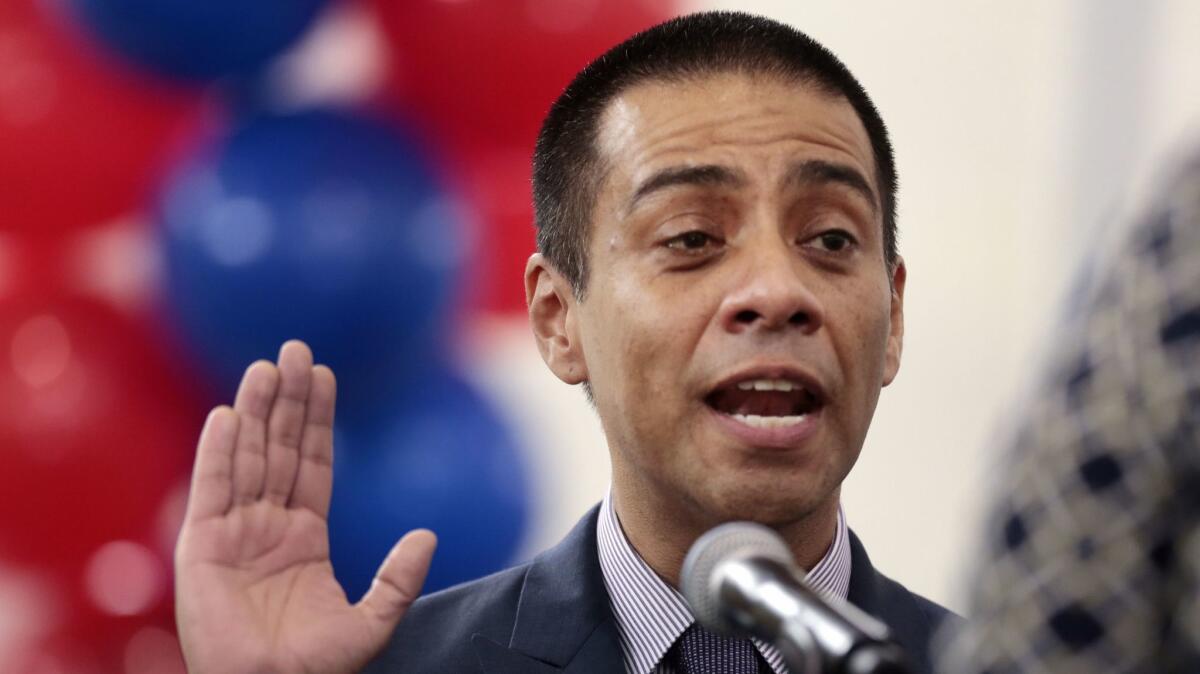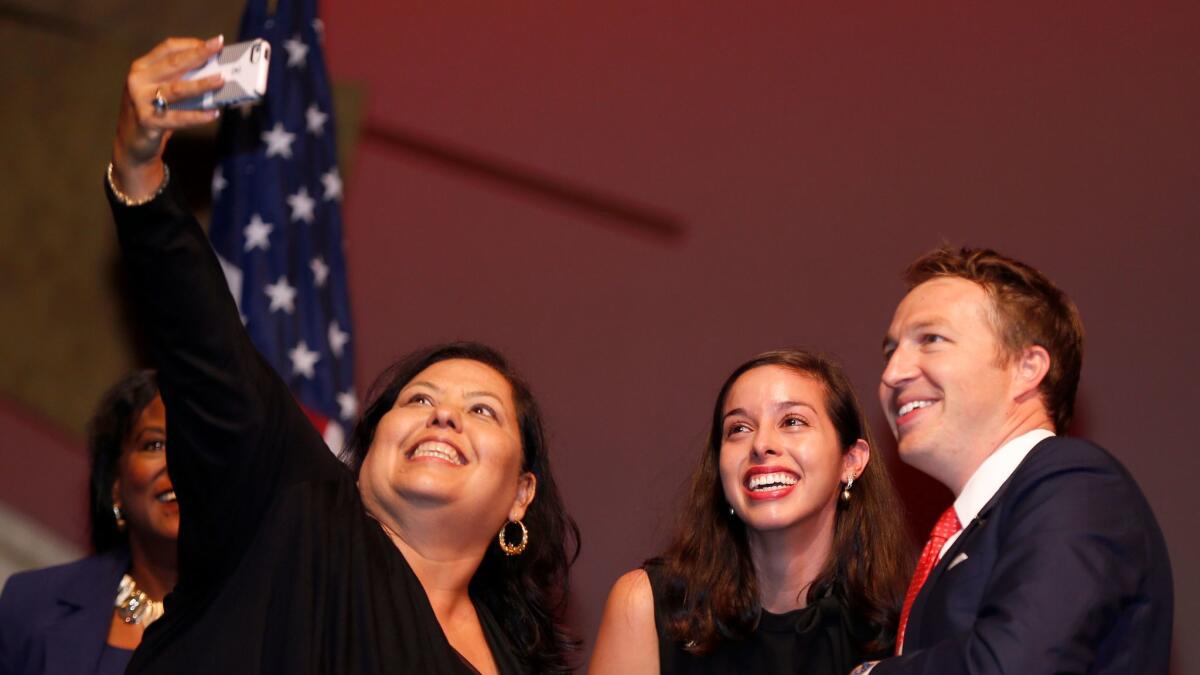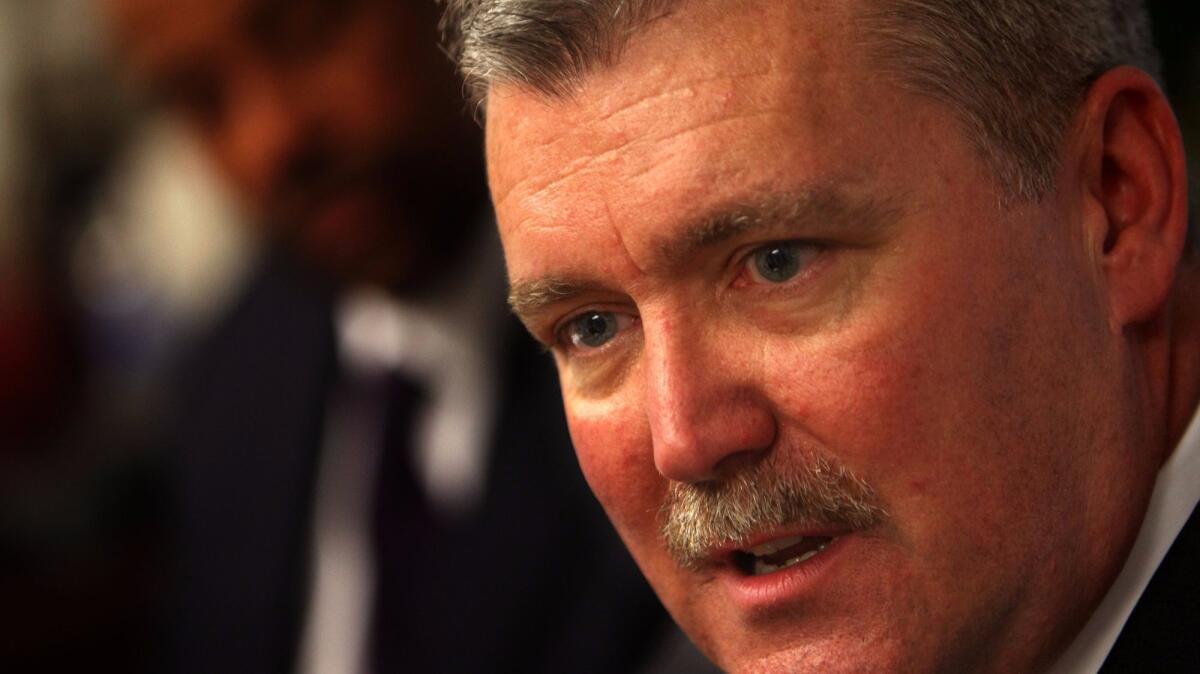Q&A: Ref Rodriguez won’t step down. Now what?

- Share via
It’s been nearly two months since prosecutors charged L.A. school board member Ref Rodriguez with multiple felonies and misdemeanors, accusing him of political money laundering. At first, as he attended board meetings, his colleagues said little about his legal troubles. But after the charter school network he co-founded recently raised separate questions, about alleged conflicts of interest, his three closest allies on the board publicly asked him to take a leave of absence.
He said no.
Like Rodriguez, the board members who spoke out were elected with substantial support from backers of charter schools. With him, board President Monica Garcia, Nick Melvoin and Kelly Gonez hold a 4-3 majority.
Rodriguez’s presence on the Board of Education will matter on upcoming votes important to charter school supporters. On Tuesday, more than a dozen charter schools are counting on him to back their rebellion against rules imposed by the district’s charter-school division.
All of which makes his allies’ stand particularly interesting, and makes reading the board tea leaves tricky. Here’s a breakdown of some key issues.
Why was it noteworthy that these three school board members proposed the leave of absence?
They are Rodriguez’s ideological allies. They had selected him as board president in July, after they won a majority in this year’s elections. He resigned from that leadership role when he was charged, but his vote counts as much as ever in their 4-3 majority.

Is a leave of absence really possible?
L.A. Unified general counsel David Holmquist said there’s no district policy on taking a leave of absence. Nor could he find a specific provision in state law. The closest analog, he said, is Government Code Section 1770(g), which covers a public official abandoning his post.
According to that code, an office becomes “vacant” if a public official ceases “to discharge the duties of his or her office for the period of three consecutive months, except when prevented by sickness, or when absent from the state with the permission required by law.”

Saying you’re taking a leave of absence, Holmquist said, would be like declaring in advance: “I’m not planning to perform the functions of a board member for some time.” And leave of absence or not, after three months, Rodriguez’s job would be considered abandoned.
How likely is it that Rodriguez’s problems could be resolved in less than three months?
Barring a plea deal with prosecutors, proceedings could last for several years.
“Trials are the last step in the process, and right now we’re at the first step,” said his attorney, Daniel Nixon, after the Oct. 24 arraignment, when Rodriguez pleaded not guilty to the money-laundering charges.
I don’t understand how you would do a leave.
— board member Richard Vladovic
State regulators might not even begin to investigate the more recent conflict-of-interest allegations raised by the charter school network until the money-laundering case is resolved. (Through Nixon, Rodriguez also has denied wrongdoing on this front.)
Why might Rodriguez’s closest colleagues want him to take a leave?
Their brief statement suggested that they wanted to minimize a distraction that could impede the work of the nation’s second-largest school system.
Garcia and Melvoin did not make themselves available to be interviewed, but Gonez said Rodriguez’s staff members could help fill in the gap when Rodriguez was on leave.
“Constituents would still have someone to call if there was an issue at the school,” she said.
She said she was aware of the three-month legal limit of any absence and that she understood that might not be enough time for Rodriguez to get past his problems.
How important is Rodriguez’s vote on upcoming issues?
Potentially crucial.
At Tuesday’s board meeting, for example, district staff members plan to recommend that 10 charter schools be shut down because they refuse to comply with district rules.
The futures of six other charter schools also are at risk, mostly over the same issues. All told, there have never been as many L.A. charter schools facing potential closure at one time — certainly never over conflicts they instigated.
Charter leaders say they are standing up against regulations they find onerous. For now, they appear ready to leave it to board members to decide their schools’ fates.
The majority that includes Rodriguez has the votes to help them, though it’s not clear what board members will decide.
I wouldn’t want him to give me advice, and I can’t give him advice. He’s legally entitled to vote until he’s not entitled.
— board member George McKenna
Some charter leaders have acknowledged the allegations against Rodriguez are serious, but a group that took part in a media call this week declined to respond when asked if Rodriguez should recuse himself from voting.
How well received was the call for a leave of absence?
Some observers praised the three board members as ethical stewards of the public interest, willing to speak out against an important ally.
“It’s nice in the political miasma we’re in these days to see people act with a kind of integrity,” said Robert Shrum, director of USC’s Unruh Institute of Politics. “They’re not willing to say, ‘We’ll put up with this to forward our substantive agenda.’ They did the right thing.”
But others saw Rodriguez’s allies’ request as a cynical attempt to distance themselves — and other charter school supporters — from association with possible wrongdoing, while knowing they would hold onto Rodriguez’s vote.
“Image and perception are two key elements for any politician and that is what these board members were doing,” said Roberto Fonseca, a longtime local parent activist. These ideological allies of Rodriguez acted “to protect themselves and what they represent.”
How are other board members reacting?
The other three board members are not associated with Rodriguez’s bloc.
“I wouldn’t want him to give me advice, and I can’t give him advice,” George McKenna said of Rodriguez. “He’s legally entitled to vote until he’s not entitled to.”
“I don’t understand how you would do a leave,” said Richard Vladovic. “And I don’t know the implications. It’s so uncharted.”
Scott Schmerelson did not make himself available for an interview.
Twitter: @howardblume
Sign up for Essential California
The most important California stories and recommendations in your inbox every morning.
You may occasionally receive promotional content from the Los Angeles Times.








